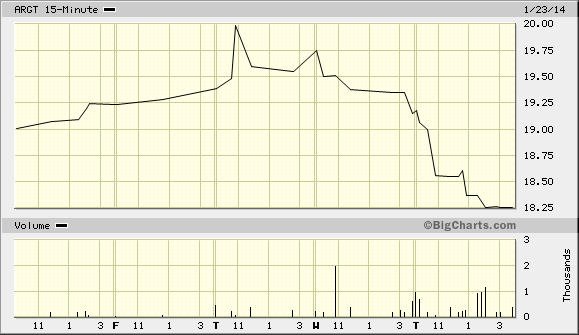Argentine stocks just got hit by a perfect storm.
Investors have been generally timid in 2014, digesting the gains of last year and unsure of where to invest next. Add to this the bad data coming out of China—a key manufacturing survey showed an unexpected decline—and renewed weakness in the Turkish lira, and emerging markets were primed for a correction. And the rout in the Argentine peso was the straw that broke the camel’s back.
Argentine stocks, as measured by the Global X FTSE Argentina 20 ETF (ARGT) fell 4.7% on Thursday and is down nearly 7% in 2014. Some of the more liquid name fell even harder; Argentine oil major YPF SA (YPF) closed Thursday down over 15%.
So, is it time to buy Argentina?
The market is certainly cheap enough. Using the Shiller cyclically-adjusted price/earnings ratio, Argentina is one of the cheapest markets in the world. With a CAPE of just 7.4, Argentina is cheaper than every market in the world save Greece and Russia.
Still Thursday’s rout—and the reasons behind it, most notably currency weakness—warrant moving slowly. I recommend putting ARGT on your watch list. Based on current prices, the Argentine market could double in price and still be cheap. But in the immediate short-term, this rout could very easily progress to a larger correction or even a cyclical bear market.

Don’t try to catch a falling knife here. Give the Argentine market a few weeks to see if it can resume its uptrend, and then plan on holding for 1-2 years. Argentina is looking at a presidential regime change, and I expect the next president—whoever they are—to be friendlier towards business. Even the current Kirchner regime is started to soften the anti-capitalist policies it has pursued for the past decade. When foreign capital “rediscovers” Argentina, I expect Argentine stocks to enjoy a fantastic multi-year bull market.
Note: Due to stop losses getting hit in the recent selloff, I had to recommend selling two Argentine stocks I had previously recommended in Macro Trend Investor. It is important to me that the advice I give be consistent, so I want to clarify that the sell decision for the two stocks in question was due to the risk management rules I had in place going into the trades and not due to a change in sentiment on my part.
= = =
Charles Lewis Sizemore, CFA, is the chief investment officer of the investment firm Sizemore Capital Management. As of this writing, he did not hold a position in any of the aforementioned securities. Check out his new premium service, Macro Trend Investor, which includes a free copy of his e-book, The New Megatrend Investor: The Ultimate Buy-and-Hold Strategy That Will Make You Rich.




